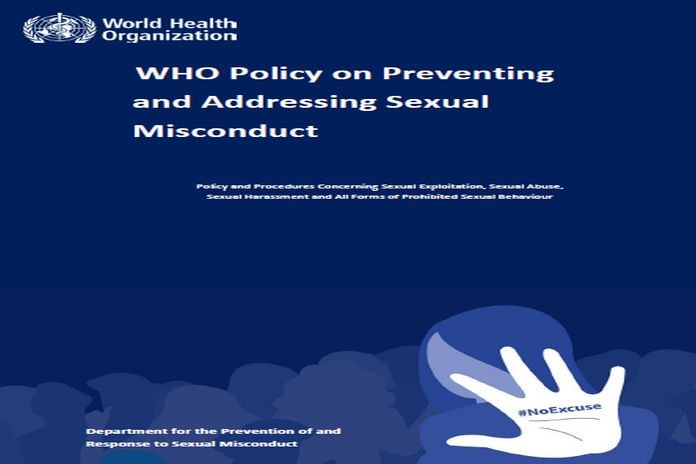GENEVA, Switzerland – The World Health Organization Friday launched its Policy on Preventing and Addressing Sexual Misconduct[*] which places the victims and survivors at its core, sets strict standards of zero tolerance and stresses that there can be “no excuse” for sexual misconduct.
The new policy replaces a 2017 policy, which investigations and audits found to have gaps in addressing the problems faced by victims and survivors of sexual misconduct.
“The suffering of the survivors of the abhorrent cases of sexual misconduct during the response to the 10th Ebola outbreak in DRC has been the catalyst for a profound transformation of WHO’s approach to preventing and responding to sexual exploitation, abuse and harassment,” said Dr Tedros Adhanom Ghebreyesus, WHO director-general. “This new policy builds on the work we have already done in implementing the recommendations of the Independent Commission, and is a key part of making ‘zero tolerance’ a reality and not merely a slogan.”
The policy covers WHO staff and collaborators (consultants, contractors, partners) in locations where WHO operates, and sets six minimum standards to protect anyone subject to sexual misconduct by WHO staff or collaborators.
The policy outlines responsibilities of individual members of the workforce, managers, and the Organization as a whole to prevent and respond to sexual misconduct, and provides several reporting options that protect the confidentiality of victims and survivors. There is no requirement for an individual to be a direct or indirect beneficiary of WHO to be recognized as a victim or survivor of sexual misconduct.
“With our new policy, we aim to ensure that our personnel and implementing partners do no harm to the people we serve or the people we serve alongside with”, said Dr Gaya M Gamhewage, director of Prevention of and Response to Sexual Misconduct (PRS). “Going forward, we want to ensure that no victim goes unheard or unsupported; no perpetrator goes unpunished; no member of staff has an excuse for misconduct or for inaction; and no partner is exempt from meeting our standards.”
The new policy is a key component of the comprehensive programme WHO is rolling out in response to the findings of the Independent Commission that the WHO director-general established in 2020 to look into allegations of sexual exploitation and abuse during the response to the 10th Ebola outbreak in the Democratic Republic of the Congo.
WHO set up a Survivor Assistance Fund with an allocation of US$2M for 2022/2023 to support the victims and survivors with services including medical support; psychological, mental health and case-management support; legal support; and socio-economic re-insertion support and training in an income- generating activity.
WHO has also made substantial investments to strengthen WHO’s core capacities for preventing and responding to sexual misconduct and to eliminate the backlog in investigations of sexual misconduct. The backlog has since been cleared and a benchmark of 120 days has been set by the investigations team to complete investigations of any new allegations of sexual misconduct or other forms of abusive conduct. WHO now publishes a dashboard listing investigations completed and disciplinary action taken in cases of sexual misconduct.





